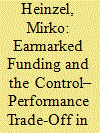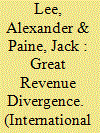|
|
|
Sort Order |
|
|
|
Items / Page
|
|
|
|
|
|
|
| Srl | Item |
| 1 |
ID:
191917


|
|
|
|
|
| Summary/Abstract |
Any act of battlefield violence results from a combination of organizational strategy and a combatant's personal motives. To measure the relative contribution of each, our research design leverages the predictable effect of ambient temperature on human aggression. Using fine-grained data collected by US forces during the Afghanistan and Iraq conflicts, we test whether temperature and violence are linked for attacks that can be initiated by individual combatants, but not for those requiring organizational coordination. To distinguish alternative explanations involving temperature effects on target movements, we examine situations where targets are stationary. We find that when individual combatants have discretion over the initiation of violence, ambient temperature does shape battlefield outcomes. There is no such effect when organizational coordination is necessary. We also find that ambient temperature affects combat-age males’ endorsement of insurgent violence in a survey taken during the conflict in Iraq. Our findings caution against attributing strategic causes to violence and encourage research into how strategic and individual-level motivations interact in conflict.
|
|
|
|
|
|
|
|
|
|
|
|
|
|
|
|
| 2 |
ID:
191918


|
|
|
|
|
| Summary/Abstract |
Since the 1990s, the funding of multilateral development assistance has rapidly transformed. Donors increasingly constrain the discretion of international development organizations (IDOs) through earmarked funding, which limits the purposes for which a donor's funds can be used. The consequences of this development for IDOs’ operational performance are insufficiently understood. We hypothesize that increases in administrative burdens due to earmarked funding reduce the performance of IDO projects. The additional reporting required of IDOs by earmarked funds, while designed to enhance accountability, ultimately increases IDOs’ supervision costs and weakens their performance. We first test these hypotheses with data on project costs and performance of World Bank projects using both ordinary-least-squares and instrumental-variable analyses. We then probe the generalizability of those findings to other organizations by extending our analysis to four other IDOs: the African Development Bank (AfDB), Asian Development Bank (ADB), Caribbean Development Bank (CDB), and International Fund for Agricultural Development (IFAD). Using data on the performance of 7,571 projects approved between 1990 and 2020, we find that earmarked funding undermines both cost-effectiveness and project performance across IDOs. Donors seeking value for money may consider allocating more money to core funds rather than to earmarked funds.
|
|
|
|
|
|
|
|
|
|
|
|
|
|
|
|
| 3 |
ID:
191916


|
|
|
|
|
| Summary/Abstract |
How do states distribute the burdens of collective defense? This paper develops a network theory of burden sharing. We focus on bilateral defense cooperation agreements (DCAs), which promote cooperation in a variety of defense, military, and security issue areas. Using a computational model, we show that DCA partners’ defense spending depends on the network structure of their agreements. In bilateral terms, DCAs increase defense spending by committing states to defense activities and allowing partners to reciprocally punish free riding. However, as a state's local network of defense partnerships grows more densely connected, with many transitive “friend of a friend” relations, DCAs have the countervailing effect of reducing defense spending. The more deeply integrated states are in bilateral defense networks, the less they spend on defense. We distinguish two potential mechanisms behind this effect—one based on efficiency improvements, the other on free riding. An empirical analysis using multilevel inferential network models points more to efficiency than to free riding. Defense networks reduce defense spending, and they do so by allowing countries to produce security more efficiently.
|
|
|
|
|
|
|
|
|
|
|
|
|
|
|
|
| 4 |
ID:
191915


|
|
|
|
|
| Summary/Abstract |
This article describes and explains a previously overlooked empirical pattern in state revenue collection. As late as 1913, central governments in the West collected similar levels of per capita revenue as the rest of the world, despite ruling richer societies and experiencing a long history of fiscal innovation. Western revenue levels permanently diverged only in the following half-century. We identify the twentieth-century great revenue divergence by constructing a new panel data set of central government revenue with broad spatial and temporal coverage. To explain the pattern, we argue that sustainably high levels of revenue extraction require societal demand for an activist state, and a supply of effective bureaucratic institutions. Neither factor in isolation is sufficient. We formalize this insight in a game-theoretic model. The government can choose among low-effort, legibility-intensive, and crony-favoring strategies for raising revenues. Empirically, our theory accounts for low revenue intake in periods of low demand (the nineteenth-century West) or low bureaucratic capacity (twentieth-century former colonies), and for eventual revenue spikes in the West.
|
|
|
|
|
|
|
|
|
|
|
|
|
|
|
|
| 5 |
ID:
191912


|
|
|
|
|
| Summary/Abstract |
A distinguishing feature of the modern state is the broad scope of social welfare provision. This remarkable expansion of public assistance was characterized by huge spatial and temporal disparities. What explains the uneven expansion in the reach of social welfare? We argue that social welfare expansion depends in part on the ability of the governed to compel the state to provide rewards in return for military service—and crucially, that marginalized groups faced greater barriers to obtaining those rewards. In colonial states, subjects faced a bargaining disadvantage relative to citizens living in the colony and were less likely to win concessions from the state for their wartime sacrifices. We test this argument using a difference-in-differences research design and a rich data set of local spending before and after World War I in colonial Algeria. Our results reveal that social welfare spending expanded less in communes where the French subject share of the population was greater. This paper contributes to the state-building literature by highlighting the differential ability of the governed to bargain with the state in the aftermath of conflict.
|
|
|
|
|
|
|
|
|
|
|
|
|
|
|
|
| 6 |
ID:
191914


|
|
|
|
|
| Summary/Abstract |
Charles Tilly's classical claim that “war made states” in early modern Europe remains controversial. The “bellicist” paradigm has attracted theoretical criticism both within and beyond its original domain of applicability. While several recent studies have analyzed the internal aspects of Tilly's theory, there have been very few systematic attempts to assess its logic with regard to the territorial expansion of states. In this paper, we test this key aspect of bellicist theory directly by aligning historical data on European state borders with conflict data, focusing on the period from 1490 through 1790. Proceeding at the systemic, state, and dyadic levels, our analysis confirms that warfare did in fact play a crucial role in the territorial expansion of European states before (and beyond) the French Revolution.
|
|
|
|
|
|
|
|
|
|
|
|
|
|
|
|
| 7 |
ID:
191913


|
|
|
|
|
| Summary/Abstract |
Prominent theories of state formation hold that states formed because of warfare and competition on the one hand, or the diffusion of organizational templates and practices through learning and emulation on the other. We propose that the two strands of theory can be linked to more accurately account for mechanisms of state formation. War, we argue, is an important source of social diffusion. War establishes contacts between political elites across borders, generates migratory flows, and establishes new economic networks. We examine the validity of the theory through a comparative case study of Nordic political units from the dawn of the Viking Age to the end of the High Middle Ages (CE 800–1300), finding that raids, settlements, and conquests by Norwegian and Danish rulers in England, Europe's most advanced kingdom, set in motion state formation processes in Norway and Denmark. In these cases, the winners emulated the losers.
|
|
|
|
|
|
|
|
|
|
|
|
|
|
|
|
|
|
|
|
|